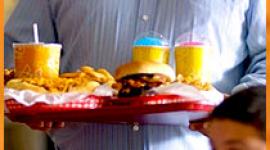Binge Eating / Compulsive Overeating with Joanna Poppink
Online Conference Transcript
![]()
Binge Eating / Compulsive Overeating with guest Joanna Poppink, MFCC
Joanna Poppink is has been treating adult women with eating disorders for over three decades. Her site, "Triumphant Journey: A Cyberguide To Stop Overeating and Recover from Eating Disorders" resides in the HealthyPlace Eating Disorders Community.
Bob M is the moderator.
People in Jersey are in the audience.
Bob M: Good evening everyone. I'm Bob McMillan, the moderator for tonight's conference. Welcome and I'm glad you could make it. Our topic tonight is Binge Eating/Compulsive Overeating. We're going to discuss some of the reasons behind it and then give you some concrete answers to the question of how you can overcome it...or deal with it. Our guest tonight is psychotherapist, Joanna Poppink, MFCC. Joanna has been in private practice in Los Angeles, California for nearly 18 years. In her practice, she has worked with many overeaters and helped them deal with the challenges they face because of their overeating. In addition, Joanna has written a guidebook of sorts, which is posted on the internet entitled: "Triumphant Journey: A Cyberguide to Stop Overeating and Recover From Eating Disorders". I'll be posting the URL for that later in the conference. Good evening Joanna and welcome to the Concerned Counseling website. I'd like to start off by having you describe some of your experience and work with overeaters.
Joanna Poppink: Hello Bob and all. I'm delighted to be with you tonight. Yes, I've been working with people who have eating disorders for many years. My work involves research, deep intimate work with individuals and also explorations into the community with a focus on 12 step programs. In addition, I am continually discovering that metaphors from biology and various sciences, coupled with dream work helps individuals get a closer appreciation and understanding of their own situation.
Bob M: I'm going to assume that people here tonight don't need to be told how to figure out if they are an overeater. But I'd like to know from you, excluding any physical ailment, like hyperthyroidism, etc., why do people overeat?
Joanna Poppink: The short answer to this complex and personal question is this: people overeat or binge because they are experiencing some kind of stress for which they have no tools or skills to handle. This does not, not, not, mean that overeaters or binge eaters have a personal deficiency. Often these people are extremely capable. However, somewhere in their history, they learned to cope with stress through food behaviors because they had no access to other methods of protection, adaptation or development.
Bob M: Are people who overeat readily aware that they aren't coping in a positive way with this stress, or for the most part, does it have to be pointed out to them?
Joanna Poppink: It's usually a mix. First, everyone who comes into therapy is in a different stage of their eating disorder. Some people have been binging and purging for a year or so. Others have been engaging in various eating disorder behaviors for as much as 25 or 35 years. So there is, as you can imagine, a tremendous range of awareness levels. However, while most do know that they use the binging to cope with their lives, they often do not appreciate the details. For example, many people with eating disorders are familiar with binging after a party at home when all the guests have left. Or they are familiar with binging after returning from a wonderful holiday. Certainly, they make assumptions about their binging after a sad, tense or painful experience. But they usually do not understand why they may binge after a happy experience.
Bob M: In your cyberguide to stop overeating, you speak of "essential equipment" that are necessary to be free of overeating. Could you elaborate on that, please?
Joanna Poppink: Yes. The development of an eating disorder serves a survival purpose. No matter how destructive overeating may be in a person's life, it is maintaining a level of existence that is tolerable, if barely (effects of binge eating). To begin to tamper with that balance, that system can release all kinds of surprising and disruptive feelings and actions. The inner equilibrium of the person is disturbed. This is necessary for healing, but it's a shock. So, in preparation for that, the person ready to undertake their healing journey can know this and gather essential equipment. Examples are a safe place to communicate either with self or a therapist or both. That means arranging for private time. Setting up a journal, scheduling walks, arranging for telephone contact with trusted people who can be told intimate details, going to 12 step meetings, all this creates tools that help with handling the emotions which will be released in change. Healing from overeating and binging is truly a courageous undertaking. People don't have to take on the challenge bare and alone. There is help and helpful equipment to use along the way.
Bob M: We are speaking with psychotherapist, Joanna Poppink, M.F.C.C., from Los Angeles, California. Joanna has done a lot of research on overeating treatment and works with many overeaters in her practice. She wrote an internet guidebook entitled "Triumphant Journey: A Cyberguide to Stop Overeating and Recover from Eating Disorders". A few other tools mentioned in Joanna's cyberguide include: being honest with yourself, accepting you don't know all the answers and that you will allow others to help, learning to recognize your own limits, gaining an appreciation that your binge eating has gone on for a while, it won't end overnight, and finally and very importantly, being kind to yourself. I'll be posting the cyberguide url later in the conference. Here are some audience questions Joanna:
|
|
tennisme: This sounds so wonderful, but when things stop around us we still feel the inner torment. These feelings become intolerable so some of us go back to food or sometimes substances. What do you recommend when we are alone?
Joanna Poppink: Being alone and then alone with your thoughts, and especially, being alone with repetitive thoughts, is part of the healing challenge. The torment can be agony. I know. Binging is a way to get relief. Postponing for even a minute or 30 seconds can be a win. You get to find out that you can bear something a hairsbreadth longer than you thought. That can build strength if you are kind to yourself and appreciate your own efforts to heal and develop. And, journal, call a friend, call your therapist, call 12 step participants, go to a meeting, read poetry. One person I know said that going to a poetry book at 3:00 a.m. is like her soul dialing 911. And don't be hard on yourself for being in a difficult position. It's difficult to heal from overeating and binging.
JoO: Well -- you have said things that are very true. I have walked the walk and gone through various 12 step programs including AlAnon, ACOA, and Overeaters Anonymous. Each step along the way I received a bit more help. But it has taken ages. Now I am at the stage where I have to stop with the excuses...one of which is well people don't keep it off...etc. I think I have arrived at the point where I've almost put myself on self-destruct through weight and can't seem to stop the roller coaster. How do you get to the point where you say to yourself: "I have to do something and I'm going to do this now"?
Joanna Poppink: Sometimes you can hear the tone in your voice that comes from inner deeps and you know you must follow what you are saying to yourself. However, most of the time that voice is a critical voice that is more punishing than inspiring. So, I recommend that you approach the situation from an entirely different vantage point. Instead of pushing hard on losing weight, stopping eating behaviors, focus on expanding your perspective. Give yourself other kinds of nourishment. Read the classics. Take a class in something you know nothing about. Put yourself in a beginner's position somewhere and start. You might be surprised to discover how hungry your mind and your soul are and how enriching your experience is when you start to feed yourself properly. If you take an art class or a woodworking class or learn to repair your car, you might find that this activity is more interesting to you than binging and you might find that you put less time in the eating activities. This is not a cure. But it is a way to break established patterns including the pattern of being self-critical. Once a pattern is disrupted, there is room for something new to emerge. And maybe what emerges is the beginning of a new way of life for you.
Bob M: One of the things you mention in your cyberguide is that painful "secrets" people carry around with them relate to their overeating. What are you referring to and how did they develop?
Joanna Poppink: In my opinion, from my research, personal experience, clinical experience, private communications and more, painful secrets are the core of eating disorder development. I pause at the keys here because this is such vast territory. I'm searching for a simple example then can send you a picture.
Okay. Here's a simple one. A family is moving from one part of the country to another. The adults talk about how wonderful this move will be for everyone. They talk about how happy the 7-year-old child will be in the new environment. When the child shows any sign of fear, pain or loss, she is metaphorically "force fed" bright happy stories. This is not bad by itself. But if the child's genuine feelings are ignored and denied, the child will not learn how to live her way through her experience. She is learning that she cannot express herself, cannot find any validation for her experience, has to find a way to tolerate the agony of loss, i.e. friends, beloved teachers, perhaps pets, neighbors, familiar beloveds of all kinds. If it's too unbearable and too unacceptable for adults to hear, the child will try and often will successfully deny her own experience. So, she has a secret from herself that she is very angry, that she feels betrayed, that she is helpless, that she has no vote, that she must go along with the powers that be. She may start tripling up on chocolate chip cookies, but she will stop complaining. Later in life she may not remember this experience at all. Or she may remember it through the adults eyes and minimize her personal experience. She probably wouldn't have vocabulary to describe it. But she will notice that she finds it difficult to say no to someone in authority.
Perhaps she gives her authority away when it's not necessary. Perhaps she eats and smiles as she agrees verbally with someone (like a spouse or a boss or a leader of some kind) and inside she disagrees very much. This can be a description of an inner secret directing a person's actions, including binge eating actions. Getting back to the original story and, most of all, getting back to those original and genuine feelings from the past, working them through with honesty, can release a person from compelling and painful behaviors in the present.
Bob M: Here's some audience reaction:
Jersey: It can come from physical abuse, emotional abuse, conditional love, etc. early in life and many other reasons.
tennisme: It is difficult to heal and hard to live with your own failures. I start each day with a vow and ultimately feel emotionally terrible, binge eating and purge. I put off the urge, but it becomes inevitable. Are these secrets then like: child abuse, emotional neglect, poor self-esteem? Are you saying our inner emotions are neglected and misunderstood, so we don't trust our own instinctual feelings?
Joanna Poppink: I am saying we do trust our feelings, but we often don't understand them. Feelings are real. They can never be wrong. They are what we feel. We don't choose our feelings. However, we can misinterpret our feelings, judge them and ourselves and dig ourselves into a pit of depression. For example, tennis me writes about failures. I strongly question the use of the word "failure". Everyone one of us is a success just by making this far. Eating disorders, binge behavior, compulsive overeating are all coping mechanisms. They are survival tools. This is what has helped the person survive. This is not failure. This is success. The person is alive and sane. The problem is that there are more benign ways of caring for ourselves than eating disorders. So first, it helps to recognize that when you are binging or overeating, you are trying to take care of yourself in the ways you developed when this was the best you could come up with. The behavior is a clue, a signal, that something is going on that needs attention. It's not a failure. It's just using an old tool. When you start to respect that, you can become curious about exploring what other tools are available.
|
|
Bob M:Someone asked me about the overeaters program Joanna mentioned earlier. That's "Overeaters Anonymous" and they have chapters in many cities around the country. You can look up their phone number in your local phone book, or go to one of the search engines and type in "Overeaters Anonymous" and go to their site for local chapter listings. I believe the program is free of charge.
Joanna Poppink: Overeaters Anonymous is free and I do recommend it. However, I recommend many 12 step programs, even if they are not directly about eating disorders. There is much to learn from other people's struggles and wins as they move to heal from compulsive behaviors of all kinds.
Bob M: Our guest is psychotherapist, Joanna Poppink, MFCC, who has researched and written about the topic. We have covered some of the reasons why people overeat and the things and "secrets" in their lives that keep them overeating (overeating causes). I think for many, Joanna, the underlying issues probably need to be dealt with in therapy. Do you think people can accomplish these things towards recovery on their own?
Joanna Poppink: Not being able to trust other people is part of the problem. So learning to trust others is part of the healing. That can't be done theoretically. Real flesh and blood people in genuine relationship are required. What form that takes can vary. I, from my vantage point as a psychotherapist, feel that psychotherapy is crucial. However, there may be other ways to develop on honest, trustworthy and deeply sharing relationship that will contribute to the person's healing. One major problem is that the binge eater, compulsive overeater, often has not learned how to choose trustworthy people. So learning how to recognize who is trustworthy, developing a posture where people have to earn trust, is part of healing. And this requires real people in real relationship.
Hero: I was fat as a baby. To my parents food was always the topic of conversation. I have had weight problems my entire life. I was never abused. Maybe overprotected? I am angry that food was so important when I was young (and still is). Will we be able to ever find out what is really making us overeat?
Joanna Poppink: Hero, sometimes parents overfeed their babies because it's their way of giving love. What then can happen, as it does to so many, is that food becomes an expression of love: e.g. chocolate for Valentine's Day, "sweets for the sweet", and there are many other examples in our culture. So a person may reach for food when they want love. There's soothing in the food itself. And there are associations of love from the past connected to the food. Food then has powerful drawing power when you feel insecure and needing love. Yes, we can find out what is making us overeat. Maybe not the precise details. But we don't need the precise details. We don't even need historical accuracy. What we do need is respect for our own processes. When we overeat, if we recognize that we are feeling something that we do not know how to accept, then we have the guiding tool to recovery. Then we can look in our lives, in our dreams, in our last conversation and try to find what it was that made us try to run away to oblivion for safety. Once we're on that path, there is no limit to the degree of healing and personal development we can achieve.
Bob M: One of our audience members, Sincerely, also mentioned to me that "when you are missing love, affection, or similar emotions, all the food in the world won't fill up that pot." I also want to touch on the subject of "dieting" here. When I use the term "dieting", I'm talking about a person who needs to lose 10-15 pounds, because they put on a little extra weight, for whatever reasons. But, I'm wondering Joanna, does "dieting", or diet programs, work for overeaters?
Joanna Poppink: It seems that all diets work and all diets fail. When we go on a weight reduction diet, if we stick to it for a few weeks or a few months, we will lose weight. When we lose that weight we lose some protective padding between us and the world. If we have not done the inner work to prepare us and to equip us to handle the world better, we will put that padding back on. Because our psyches now know that the original padding was not adequate (because we lost it), we will make adjustments in our inner formulas. We won't only regain the lost weight. We will gain extra for insurance. It's so important to remember that when diets fail, it is the diet that is failing, not the person. Diets can work for overeaters if the overeater addresses the issues that govern his or her eating. If and when she or he feels and is more powerful and able in addressing the challenges the world offers us, the padding is not as necessary. Then a diet can work. Although often, at that point, the person's weight goes down without dieting. Binging just isn't as interesting anymore. The person has more interesting things to do in life.
Bob M: Some more audience comments:
JoO: Some of us were brought up in the age where to seek help, or even to recognize the need, was shame-based. Emotional abuse, drunken parent you babysat and took the blame for his drinking, etc. So through 57 years, I have had to deal with this on my own because I couldn't 'allow myself' to feel.
Heavenly: exactly!!!!!! Is it best then to see a private therapist to work out problems before going to O.A.?
Joanna Poppink: Either way is fine. I do recommend that you see a therapist who is somewhat familiar with 12 step programs. In my work, I have recommended that people go to meetings. And people have come to me after being a participant in 12 step meetings. You can't really make a mistake here. The main thing is to begin. To JoO, not allowing yourself to feel is what eating disorders are all about. It's such a lonely place to be. And what makes it worse is when you do start to feel something and then criticize yourself for it. And that's part of eating disorders too. This is why I recommend that people go to all kinds of 12 step programs and listen. You will, at some point, hear someone tell your story, describe your feelings and show you how they are finding their way to a better life. Part of the nourishment needed in healing is valid, honest and trustworthy inspiration from real people. There are many people, including the people who participate on this site, who I'm certain, will applaud your allowing yourself to feel. Keep it up.
Bob M: As with everything, find a therapist that is good for you. If you are interested in 12-step programs, make sure you choose a therapist who is familiar with them. How? By calling around and asking them directly.
Joanna Poppink: Thank you for having me. This was a pleasure.
Bob M: And to everyone in the audience, I hope tonight's conference was helpful. Remember, it's up to you to take the first steps and then follow through. Good Night.
|
|
APA Reference
Gluck, S.
(2007, February 27). Binge Eating / Compulsive Overeating with Joanna Poppink, HealthyPlace. Retrieved
on 2026, March 3 from https://www.healthyplace.com/eating-disorders/transcripts/binge-eating-compulsive-with-joanna-poppink




